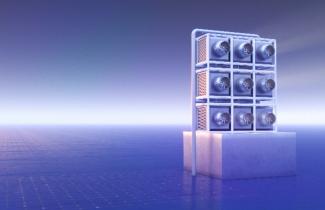NETL received stakeholder feedback and suggestions as the Lab prepares to launch a $25 million Direct Air Capture (DAC) Test Center that will identify promising technologies to separate carbon dioxide (CO2) from ambient air so the greenhouse gas can be safely and permanently stored deep underground or converted into value-added products.
DAC is considered a growing and necessary field that still requires significant investments to create a cost-effective and economically viable technology that can be deployed at a large scale and help address the climate crisis and achieve net-zero carbon emissions by 2050 — a key priority for the Biden-Harris Administration.
As the name implies, DAC is a process of capturing CO2 directly from air, rather than point sources such as power plants. The process generates a concentrated stream of CO2 for sequestration in the subsurface or utilization as a feedstock to produce chemicals and products such as concrete.
As part of the 2022 Carbon Management Research Project Review Meeting, which was held in Pittsburgh, Pennsylvania, Aug. 15-19, NETL held a collaborative workshop to discuss the center’s capabilities and ensure it will serve as an asset to mitigating CO2 concentrations in the atmosphere when it goes live in spring 2024.
The workshop was an opportunity for scientists and engineers, universities, research institutions and businesses developing DAC technologies, which typically do not have the resources or experience on their own to construct, operate and comprehensively analyze the results of DAC testing, to offer their ideas and share their needs in order to design a DAC center that meets the testing requirements of as many potential technologies as possible.
“NETL has been at the forefront of carbon capture and storage research for decades. We are now leveraging our wide-ranging expertise to advance DAC, an emerging technology, and lower the cost of DAC systems,” said Ron Breault, supervisor, Thermal Sciences Team.
“Direct air capture technologies are an essential component of the toolkit needed to reach net-zero emissions, but are yet to be demonstrated at the scale necessary for climate impact,” said Nathan Weiland, senior fellow, Energy Conversion Engineering.
“By developing this first-of-its-kind center, NETL will establish a facility where DAC technology concepts and prototypes can be tested and demonstrated at a sufficient scale to support technology maturation for commercial use,” Weiland said.
NETL researchers have studied two DAC approaches: active and passive. Active air contractors use fans or blowers to move the air through the adsorbing materials while passive contractors use wind to move the air across the adsorbing material.
CO2removal is achieved when ambient air contacts chemical media, typically a solvent or sorbent. The carbon is removed from the capture media through the application of heat or other energy input, producing high-purity CO2 and renewing the solvent or sorbent.
However, different DAC systems have different optimal configurations and operational conditions, depending on environmental conditions, the solvent or sorbent material, and available energy sources for its regeneration. Techno-economic analyses, which are completed by NETL, can help developers of DAC technologies make crucial decisions, including how to balance the capacity of a sorbent or solvent with other factors such as the amount and cost of energy required for operation.
The NETL center will house flexible, multi-scale DAC test platforms for concurrent, fully integrated operations over a wide variety of relevant conditions such as temperature, pressure and relative humidity.
Emphasis will be placed on data acquisition and quantification of process parameters to reduce technical risk and cost. “Reducing costs and uncertainty are critical to attracting public investment and paving a path to commercialization and deployment,” Breault said.
The center will fill the void of available and easily accessible facilities to test emerging technologies between the bench and pilot scales to expedite the development of DAC technologies. Research will also focus on the development of effective low-cost sorbents, solvents and other materials that will increase the amount of CO2 removed by DAC and improve the energy efficiency of carbon-removal operations.
NETL is a U.S. Department of Energy national laboratory that drives innovation and delivers technological solutions for an environmentally sustainable and prosperous energy future. By leveraging its world-class talent and research facilities, NETL is ensuring affordable, abundant and reliable energy that drives a robust economy and national security, while developing technologies to manage carbon across the full life cycle, enabling environmental sustainability for all Americans.




